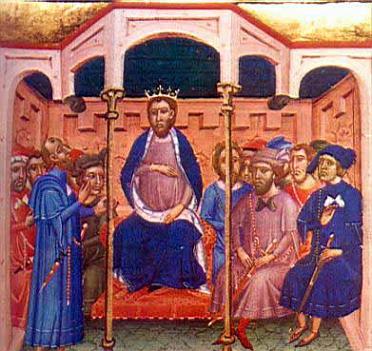The later years (1305-1311) of Arnau de Vilanova’s life were quite hectic and filled with constant journeys. He was as likely in Barcelona as in Avignon, Sicily, Naples or Almería. He still had enough time to care for patients such as the Catalan kings, Clement V and King Charles of Naples, and to write medical works, including some of his most prominent ones like the Regimen sanitatis ad regem Aragonum, for the preservation of King Jaume’s health and the Speculum medicinae, an ambitious theoretical synthesis. His diplomatic activities, acting as a representative among Kings Jaume of Aragon, Frederick of Sicily and the Pope, led him to the forefront of politics. He devised a plan to reform Christianity which these kings were to spearhead with the help of the Holy See. Frederick of Sicily was enthusiastic, but the top church authorities mistrusted them and Jaume II was not entirely convinced. Ultimately, Jaume asked Arnau for an explanation of the exposition that Arnau had made in Avignon before the Pope and the cardinals. Master Arnau went to Almería, the city that the king and his troops were besieging, to provide explanations, but the king mistrusted Arnau de Vilanova’s attitude and withdrew his friendship. Some of his best spiritual works date from this period, including advice to Beguins and to Frederick of Sicily on a wide variety of topics. Frederick decided to apply Arnau de Vilanova’s reformist plans in Sicily and transform some of the recommendations from the Informació espiritual into articles in the constitutions of his kingdom. Arnau got involved in the major issues of the day, such as the Templar affair and the controversy over the spiritual Franciscans, and in the context of his reform plans he even tried to request the title of King of Jerusalem, currently held by the King of Naples, for Frederick of Sicily.
Arnau de Vilanova died in early September 1311 during a sea journey off the coast of Genoa. In 1305, he had made a will, which was joined by a codicil in 1308. We are not sure where he was buried, but in his will he asked to be buried in the parish church of the place where he died.
On the 8th of November 1316, Jofre de Cruïlles, the acting provost of the archbishopric of Tarragona, and Joan de Llotger, published a ruling that condemned numerous theological theses extracted from different works and banned ownership and reading of Arnau’s works.
